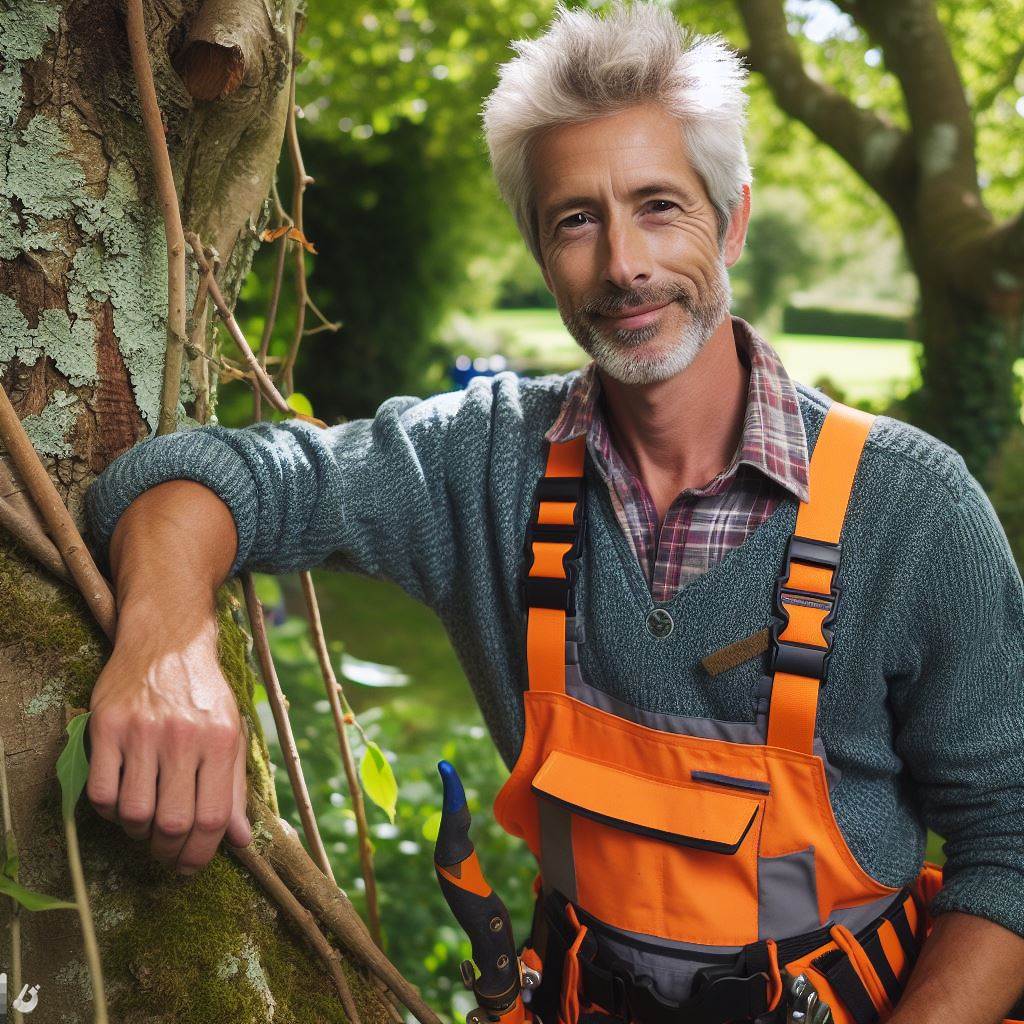Introduction
Tree conservation ethics, an integral aspect of environmental stewardship, holds immense relevance in the context of the United Kingdom’s rich natural heritage.
It encapsulates the ethical responsibility to protect and sustainably manage tree populations.
The significance of tree conservation in the UK cannot be overstated.
Beyond the aesthetic appeal of lush landscapes, trees play a crucial role in maintaining biodiversity, mitigating climate change, and enhancing overall ecological resilience.
Acknowledging the importance of these environmental services is paramount in navigating the challenges posed by urbanization and climate variability.
The purpose of this blog post is to delve into the multifaceted dimensions of tree conservation ethics within the UK.
Arborists, policymakers, and the public guide tree conservation ethically, fostering understanding of ethics’ role in effective practices.
Through this exploration, we seek to highlight the imperative for collective action in preserving the UK’s arboreal treasures for future generations
The ecological significance of trees
- Trees play a crucial role in carbon sequestration and climate regulation, helping combat global warming.
- They provide habitats for wildlife, offering shelter, nesting sites, and food sources.
- Trees enhance biodiversity by supporting a variety of plant and animal species in their ecosystems.
Highlight the socio-economic benefits of trees
- Trees contribute to tourism and recreation by attracting visitors and providing scenic landscapes.
- They improve air and water quality by filtering pollutants, reducing pollution-related health risks.
- Trees enhance aesthetic value, making urban areas more appealing and increasing property values.
The Importance of Trees in the UK
Trees are not just a beautiful part of our landscape; they are essential components of our ecosystems, providing numerous ecological and socio-economic benefits in the UK.
The ecological significance of trees
Carbon sequestration and climate regulation
Trees act as carbon sinks, absorbing carbon dioxide from the atmosphere during photosynthesis and storing it in their trunks, branches, and leaves.
This process helps mitigate climate change by reducing greenhouse gas emissions.
Providing habitats for wildlife
Trees offer essential habitats for a vast array of wildlife species.
They provide shelter for animals, such as birds, squirrels, and insects, serving as nesting sites and protective cover. Trees also offer food sources through their fruits, flowers, and leaves.
Enhancing biodiversity
The presence of trees contributes to the overall biodiversity of an area by supporting a variety of plant and animal species.
The diverse range of tree species in the UK creates different ecological niches, promoting a healthier and more balanced ecosystem.
Highlight the socio-economic benefits of trees
Contributions to tourism and recreation
Trees attract tourists and nature enthusiasts, especially in areas with notable tree populations or scenic woodlands.
Visitors are drawn to the tranquility and beauty of these natural environments, boosting local tourism and providing recreational opportunities like walking, hiking, and camping.
Improving air and water quality
Trees act as natural air filters, trapping and absorbing pollutants such as carbon monoxide, nitrogen dioxide, and particulate matter.
Personalized UK Career Consulting
Receive tailored career guidance designed just for you. Get actionable steps and expert support to boost your career in 1-3 days. Take control of your career now.
Get StartedThey help reduce air pollution levels, improving air quality for humans and other living organisms.
Additionally, tree roots play a vital role in preventing soil erosion and filtering water runoff, promoting clean and healthy water sources.
Enhancing aesthetic value
Trees greatly enhance the visual appeal of both urban and rural landscapes.
In cities, trees soften the harshness of concrete environments and provide shade, making streets and parks more inviting.
They also increase property values, as homes surrounded by greenery are generally considered more desirable.
Basically, trees in the UK have tremendous ecological significance. They help combat climate change, provide habitats for wildlife, and enhance biodiversity.
To sum it up, trees offer socio-economic benefits by attracting tourists, improving air and water quality, and enhancing the aesthetic value of our surroundings.
It is crucial to recognize and prioritize tree conservation ethics to preserve these invaluable natural resources for current and future generations.
Read: Sustainable Practices in UK Aquaculture Tech
Tree Conservation Ethics
Tree conservation ethics play a crucial role in ensuring the preservation and sustainable management of trees in the United Kingdom.
By adhering to these ethical principles, individuals and organizations can contribute to the long-term health and vitality of forests and their associated ecosystems.
Explore the principles underlying tree conservation ethics
Sustainable management
Trees are essential for maintaining balanced ecosystems and the overall health of our planet.
Sustainable management involves practices that enable the continuous growth and regeneration of forest resources.
This includes implementing responsible logging techniques, preserving biodiversity, and minimizing the use of harmful chemicals.
Consideration for future generations
Tree conservation ethics recognize the importance of making decisions that benefit both current and future generations.
By preserving and restoring forests, we can ensure a stable climate, clean air and water, and a diverse range of habitats for plant and animal species to thrive.
Your Dream Job Starts with a Perfect CV
Get a tailored CV and cover letter that captures your unique strengths and stands out in your industry. Let us help you make an unforgettable first impression.
Get StartedThis requires long-term planning and a commitment to leaving a positive legacy for future inhabitants.
Respecting natural processes
Nature has its own self-regulating mechanisms, and tree conservation ethics emphasize the importance of respecting these processes.
Allowing trees to grow and evolve naturally, without excessive human intervention, helps maintain the ecological balance.
This includes avoiding unnecessary pruning, preserving deadwood for wildlife, and minimizing soil disturbance during logging operations.
Describing the ethical responsibilities of individuals and organizations
Planting and maintaining trees
Individuals and organizations have various ethical responsibilities when it comes to tree conservation. First and foremost, they should actively participate in tree planting and maintenance initiatives.
Whether it’s through community programs or individual efforts, planting trees helps mitigate deforestation and ensures a continuous supply of tree resources.
Responsible use of forest resources
Responsible use of forest resources is another ethical responsibility. Harvesting timber and other forest products should be done sustainably and with minimal ecological impact.
This includes following guidelines, obtaining appropriate permits, and employing techniques that promote regrowth and biodiversity.
Advocacy and education
Advocacy and education are also vital ethical responsibilities. By actively advocating for tree conservation and spreading knowledge about its benefits, individuals and organizations can inspire others to take action.
This can be done through public awareness campaigns, educational programs, and collaboration with governmental and non-governmental entities.
Essentially, tree conservation ethics encompass principles such as sustainable management, consideration for future generations, and respecting natural processes.
Individuals and organizations have ethical responsibilities to plant and maintain trees, use forest resources responsibly, and engage in advocacy and education efforts.
By prioritizing tree conservation ethics, we can contribute to the preservation and sustainable management of trees in the UK and protect our natural heritage for generations to come
Read: UK Aquaculture Technician: Career FAQs
Optimize Your LinkedIn for Success
Boost your LinkedIn profile with a professional bio, keyword-rich headline, and strategic recommendations that attract recruiters. Stand out from the crowd and get noticed.
Optimize Now
Challenges and Controversies in Tree Conservation
“Uncovering the complex realm of ‘Tree Conservation Ethics in the UK’ exposes challenges and controversies, shaping the balance between economic interests and preserving tree biodiversity.”
Conflicts with Economic Interests
- Deforestation for Development: The clash between urban development and ecological preservation is palpable. Forests succumb to the march of progress, raising ethical questions about the cost of expansion on our natural landscapes.
- Commercial Logging: Ethical dilemmas arise as the demand for timber and resources fuels commercial logging practices. The tension between economic gain and environmental preservation underscores the need for sustainable practices.
Rewilding and Nature-Based Solutions Debate
- Reintroducing Native Species: In the rewilding discourse, proponents argue for the restoration of ecosystems by reintroducing native tree species. However, skeptics voice concerns about potential unintended consequences, highlighting the need for careful consideration.
- Conservation vs. Human Needs: The debate revolves around finding a delicate balance between conservation efforts and meeting human needs through land use. Striking the right equilibrium becomes paramount as society grapples with sustainable development.
Climate Change Impact on Tree Conservation
- Changing Distribution Patterns: Global warming prompts shifts in the distribution patterns of tree species. This ecological upheaval challenges conservationists to adapt strategies to protect trees in new and unfamiliar environments.
- Vulnerability to Pests and Diseases: Climate change amplifies the vulnerability of trees to pests and diseases. As temperature and weather patterns shift, trees face increased risks, necessitating adaptive conservation measures to mitigate these threats.
As the UK navigates the complexities of tree conservation ethics, addressing these challenges requires a comprehensive understanding of the interconnected issues at play.
Balancing economic interests with ecological responsibility is the key to ensuring a sustainable and vibrant future for the country’s diverse tree species.
Read: Aquaculture Law: UK Regulations Explained
Explore Further: A Day in the Life of a UK Arboriculturist
Current Initiatives and Policies
Overview of Existing Tree Conservation Initiatives in the UK
The UK has several tree conservation initiatives aimed at preserving and protecting its rich forestry.
These initiatives involve public, private, and community-led efforts to ensure the sustainability of the country’s trees.
One such initiative is the Woodland Trust, a leading charity in the UK that aims to plant trees, protect woodland habitats, and campaign for better policies regarding tree conservation.
They work on various projects and have successfully planted millions of trees across the country.
In addition to the Woodland Trust, there are numerous community-led tree planting projects happening throughout the UK.
These projects engage local communities and promote tree conservation at a grassroots level.
Volunteers come together to plant trees, create new woodlands, and improve existing forest areas, contributing to the overall conservation efforts.
Government Policies and Regulations on Tree Conservation
The UK government recognizes the importance of tree conservation and has implemented policies and regulations to safeguard its forests.
The Forestry Commission, a government department, plays a significant role in regulating tree felling, ensuring sustainable management of woodlands, and protecting valuable habitats.
Under the Forestry Act 1967, it is mandatory for landowners to seek permission before felling certain trees.
The government also encourages landowners to create woodland management plans, which outline sustainable practices for tree maintenance.
Moreover, the UK government has set ambitious targets to increase tree planting.
They aim to plant 30,000 hectares of trees per year by 2025, further enhancing the country’s green landscape and contributing to climate change mitigation.
Successful Case Studies and Collaborations
Community-led Tree Planting Projects
Community-led tree planting projects have gained momentum in the UK, showcasing successful collaborations between local residents, organizations, and authorities.
One notable case study is the “Friends of the Earth” campaign in Brighton, where local residents joined hands to create urban orchards, ensuring the conservation of fruit trees in local neighborhoods.
Similarly, the “Trees for Life” project in Scotland focuses on restoring the Caledonian Forest.
Volunteers engage in tree planting and habitat restoration, contributing to the revival of native species and the improvement of biodiversity in the region.
Corporate Partnerships for Sustainable Forestry
Several corporations in the UK have also recognized the importance of tree conservation and have partnered with organizations to support sustainable forestry practices.
One exemplary collaboration is between Nestlé and the Woodland Trust. Nestlé aims to ensure a sustainable supply chain by working with the Woodland Trust to plant three million trees in the UK over ten years.
This initiative helps offset the company’s carbon footprint and contributes to the conservation and expansion of woodland areas.
Similarly, the Co-op, a retail company, has committed to planting one million native trees by 2025.
They collaborate with the Woodland Trust and local community groups to achieve this goal, emphasizing the importance of partnership in achieving successful tree conservation efforts.
In a nut shell, the UK has several ongoing initiatives and policies focused on tree conservation.
Community-led tree planting projects, government regulations, and collaborations between corporations and organizations are driving the conservation efforts and ensuring the sustainability of the country’s forests.
These initiatives play a crucial role in protecting the environment, enhancing biodiversity, and mitigating the impacts of climate change.
Read: Aquaculture Equipment Essentials in the UK
Discover More: Essential Skills for UK Agri-Managers in 2024
Conclusion
In closing, we’ve delved into the intricacies of “Tree Conservation Ethics in the UK,” exposing challenges and controversies.
We’ve highlighted the delicate balance between economic interests and preserving the rich biodiversity of the country’s trees.
Recognizing the paramount importance of tree conservation ethics, we must emphasize its role in sustaining the ecological tapestry.
The need for action is clear—support initiatives, contribute to tree conservation efforts, and champion ethical practices. It’s our collective responsibility to ensure the longevity of these vital ecosystems.
Let this be a call to arms, urging each reader to play a part in safeguarding the natural heritage that trees bestow upon us.
The future of our environment lies in the active engagement of individuals committed to upholding tree conservation ethics in the UK.
[E-Book for Sale]
500 Cutting-Edge Tech Startup Ideas for 2024 & 2025: Innovate, Create, Dominate
$19.99 • 500 Tech Startup Ideas • 62 pages
You will get inspired with 500 innovative tech startup ideas for 2024 and 2025, complete with concise descriptions to help you kickstart your entrepreneurial journey in AI, Blockchain, IoT, Fintech, and AR/VR.




